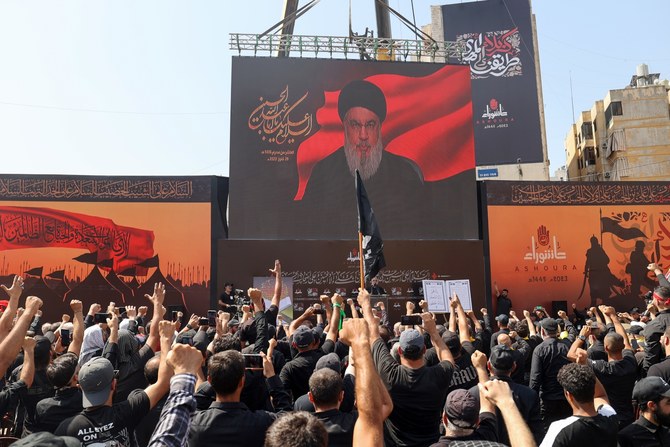Yossi Mekelberg
When Hassan Nasrallah, head of the Lebanese Shiite movement Hezbollah, celebrates something that is taking place in Israel, warning lights should begin to flash in every Israeli household. In response to the Israeli parliament’s ratification of an antidemocratic bill last week, the leader of the Iranian-sponsored movement said in a televised speech: “Today, in particular, is the worst day in the history of (Israel), as some of its people say.” He was speaking in reference to Israel’s current political crisis and he expressed his hope that “this is what puts it on the path of collapse, fragmentation and disappearance.”
Whereas such wishful thinking has been central to Hezbollah’s ideology since its inception, Nasrallah might also erroneously believe that he could give his nemesis in the south a helping hand on its route to self-destruction – an intervention that could have horrendous consequences. Such barbs and wishes for each other’s demise are not new, but on this occasion they coincide with tensions along the border and a fragility among both the Israeli and Lebanese political systems. This makes a tense situation even more susceptible to an outbreak of hostilities, whether intentional or inadvertent. This month marks 17 years since the last large-scale conflict between Israel and Hezbollah, which was prompted by the latter’s provocation on the border, when it killed and kidnapped Israeli soldiers, resulting in 34 days of war in which both sides suffered severe losses. Since 2006, the levels of mutual suspicion and vitriolic language between the two protagonists have increased exponentially, their respective political systems and societies have become even more unstable, and their devastating military capabilities have expanded. In the case of Hezbollah, it enjoys a constant stream of advanced weapons and ammunition from Iran. However, in Israel, these worrying developments along its northern border have been pushed down the government’s list of priorities as a consequence of the current constitutional crisis, despite the increasing threat of military clashes with Hezbollah.
The most recent tensions stem from moves by both Israel and Hezbollah along and close to the border, which began more than a year ago. Israel is building a wall along certain sections of the border to replace the old fence, with the aim of creating a barrier that will prevent future incursions by Hezbollah. In the past, the organization has tunneled into Israel. According to Israeli security officials, the aim was then, and remains, for the organization’s Radwan force, estimated to have 8,000 fighters at its disposal, to cross the border and capture Israeli military posts, take over major road junctions in the north of the country and to attack villages and take civilians and soldiers hostage. Israel cannot afford for Hezbollah to gain such a morale-boosting psychological victory, while it would also become vulnerable to a hostage situation. Border disputes between Israel and Lebanon are not new, but the building of a wall represents a more permanent statement of where Israel believes – or would like to believe – the border runs, a position that Hezbollah and the Lebanese government are challenging. The lack of direct communication between the two sides, the unilateral nature of the steps they take and the general distrust between them are exaggerating every disagreement disproportionately to the act itself and leading to increasing tensions. The recent dispute concerning the village of Ghajar is a case in point. It is a small Alawite village in the Golan Heights, home to about 2,700 people, which has been occupied by Israel since 1967. Since 2001, the village has been a closed military zone that visitors require special permission from the municipal council and the Israeli army to enter. However, last September, and with no prior notice, Israel erected a fence around the northern part of Ghajar, keeping all its houses inside Israeli territory despite the dispute over the location of the border in the area.
Keeping all the village’s houses within Israeli-controlled territory, regardless of the border dispute between the two countries – which are still officially at war with each other – gave Hezbollah the perfect pretext for a calculated escalation in the area. It is keeping Israel guessing about its intentions and its next moves, and it mainly presents itself as the only force in Lebanese politics that is standing up to its southern neighbor, even though it is violating the UN Security Council resolution that brought an end to the war in 2006 by erecting surveillance posts along the border, which are manned by its elite Radwan force. Moreover, back in May, to Israel’s irritation, about 200 Hezbollah fighters carried out military exercises with live ammunition and drones just 12 miles from the border, while senior members of the organization warned Israel that, in case of war, “we will rain down our precision missiles and all the weapons at our disposal.” Between this aggressive rhetoric and both sides’ actions on the ground, Israel and Hezbollah are edging closer to a military confrontation. Hezbollah would prefer a very limited confrontation in which it can make some gains, but Israel has no interest in such a scenario and has no wish to let its enemy gain any semblance of achievement. In terms of intentions and capability, Hezbollah is becoming Israel’s immediate arch-enemy – a situation made worse by its ties with Tehran and the latter’s encouragement. All the signs are that Nasrallah and his movement believe that the domestic crisis in Israel is an opportune moment to poke their militarily stronger neighbor, but to do so without provoking it to use its superior military capabilities to hit Lebanon with full force.
For now, both sides, with the help of behind-the-scenes US mediation, are managing to avoid dragging each other into a wider military clash. Israel has learned lessons from both 1982 and 2006 and is concerned with fortifying its border and preventing Hezbollah from acquiring the weapons that could alter the balance of power between the two. For Hezbollah, Israel is more a tool to maintain its political position inside Lebanon and to remain useful for Tehran in its confrontation with Tel Aviv. But by pursuing these ends, it has become a dangerous burden for Lebanese politics and society. It is a Catch-22 situation for Hezbollah: To remain relevant, it needs to maintain its conflict with Israel, but if it goes too far, it will bring about a disaster for Lebanon and possibly its own demise.







